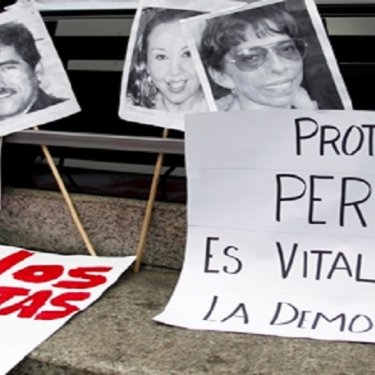Tenth Mexican journalist murdered, after cut in funding for protection

Another journalist was murdered in Mexico just a day after Reporters Without Borders (RSF) was alarmed to learn of the Mexican government’s plans to slash funding for the protection of journalists. RSF again call on the government to step up protection.
Mario Leonel Gómez Sánchez was gunned down by men on a motorcycle in the street as he was left his home in Yajalón, in the southern state of Chiapas, on 21 September. Aged 40, he was a correspondent for the regional daily El Heraldo, often covering crime and the increase in violence in the region.
Since 2010, Gómez had been receiving regular death threats and anonymous messages telling him to stop covering cases of alleged corruption implicating municipal officials. He had filed three complaints with the Chiapas authorities and had requested protection.
The Chiapas state prosecutor told RSF that two police bodyguards were assigned to Gómez in September 2017 but were withdrawn at his own request in December 2017. This was contradicted by his family, which said he was given protection in 2016 only to see it quickly withdrawn the same year without any reason being given.
Gómez’s death brings the number of journalists murdered this year in Mexico to ten, seven of whom were killed in direct connection with their journalistic activities. RSF is still investigating the most recent cases.
The day before Sánchez’s murder, the Consultative Council for the Federal Mechanism for the Protection of Human Rights Defenders and Journalists confirmed at a press conference in Mexico City that the government was cutting back funding for protection. Created in 2012, the Federal Mechanism is attached to Mexico’s interior ministry, known as SEGOB.
“This latest murder has highlighted the government’s lack of will to rein in the spiral of violence that has afflicted Mexico’s journalists for years, and the need to maintain and even reinforce the Protection Mechanism,” RSF secretary-general Christophe Deloire said. “The authorities must respect the commitments they gave in 2017, after Javier Valdez’s death, or else they will become accomplices to the next acts of violence against journalists.”
The Mechanism is currently operating more than 3,500 protective measures for journalists and human rights defenders in danger. The measures include police escorts, surveillance cameras, reception centres and alarm devices. Some of these protective measures could now be suspended and new requests for protection rejected.
Of the 126 million pesos sought by the Consultative Council to cover – until the end of the year – protective measures for the Mechanism’s 727 current beneficiaries (who include 302 journalists), SEGOB has for the time being approved only 76 million. It confirms that outgoing President Enrique Peña Nieto’s government has no interest in providing journalists with better protection.
The Mechanism’s 2019 budget is due to be approved by the Mexican congress in December, shortly after President-elect Manuel López Obrador is sworn in. It will then be up to López Obrador to decide whether to adopt a full and effective policy for protecting journalists and preventing attacks against them, as requested by RSFduring the election campaign.
The United Nations High Commission for Human Rights, the Inter-American Commission on Human Rights, Mexico’s National Human Rights Commission (CNDH) and many local and international press freedom NGOs have also voiced concern about the Mechanism’s future.
Mexico is ranked 147th out of 180 countries in RSF's 2018 World Press Freedom Index.



